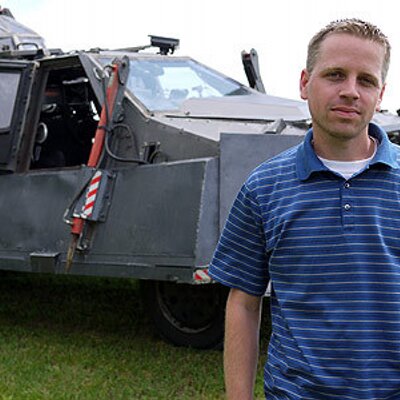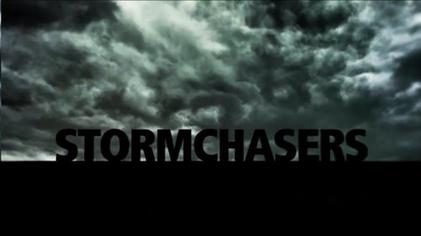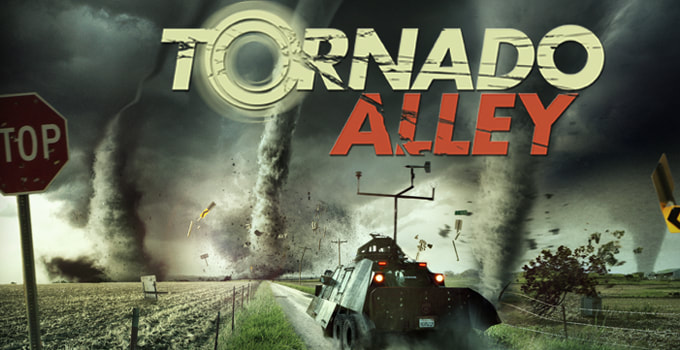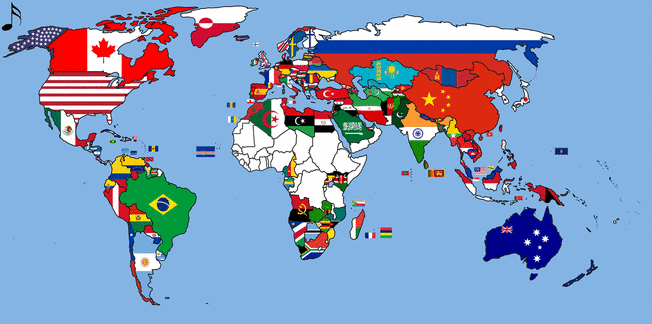|
Brandon Ivey is best known as being one of the extreme meteorologists or more appropriately called storm (tornado) chasers from the hit-series Storm Chasers. Having lead Team TIV (Tornado-Intercept-Vehicle) into countless tornadoes, with a proportion of chases ending up with a direct hit, Brandon now spends his time in the tornado season running 'Storm Chasing Tour'. By joining up to the tour, Brandon aims to show participants tornadoes up-close (as long as the tornadoes behave and act when needed) but within a respectable distance for obvious reasons. GMA decided to get in touch with Brandon to find out how feasible it could be to film a band with a passing tornado in the background, but also find out how he became involved in tornado chasing, what the future looks like for extreme weather and what working with IMAX film-maker Sean Casey was like. How did you get involved in tornado chasing? Was there anyone who inspired you? What was your first chase you recall? "I became fascinated by tornadoes and severe weather at a young age. A lot of this had to do with the storms we would experience growing up in Wichita, Kansas as a kid. I was inspired by Tim Marshall, Jon Davies, and Howard Bluestein in elementary school. My first chase was at the age of 14. I saw my first tornado when I was in high school at the age of 16." When travelling between sites where tornadic conditions are occurring, is there any music you listen to? What music are you currently listening to? "I like a lot of genres of music. I play guitar so I have a passion for music. I listen to anything from classical to country and from classic rock to some heavy metal. My guitar idols are David Gilmour, Slash, and Mike McCready. The last thing I listened to was Eddie Vedder's "Into the Wild" soundtrack." What factors would a videographer have to consider if they wanted to film a band performing whilst a tornado passed by in the background? Would such a feat be possible? "A band wanting to film in front of a tornado would find it to be a challenging feat since there are so many movie parts to such an achievement. First, most tornadoes only last 5 minutes or less, so you would only get one take! Second, you would have to be in the right position, at the right time. And the last element is you would want to be in a rather safe location to remove yourself from the risk of lightning striking you, hail crashing down, or strong outflow winds hitting you. The best bet would be to film in front of a green screen and edit in the tornado footage behind the band." What was it like working with Sean Casey? Do you keep in touch; is TIV 3 operational? "It was very fun to work with Sean. I learned a lot about filming documentaries and helped him to achieve some of the great shots you see in "Tornado Alley". We still talk on occasion, but we took separate paths in 2014 where I started a storm chasing tour company stormchasingtour.com and he went on to work on a three part IMAX film about glaciers, fires, and severe weather." Surely you'd need to have a certain mindset to chase tornadoes, do you yourself get nervous chasing? What advice could you offer those just starting out? "You need to have the passion for extreme weather to chase. If you are just out there to see tornadoes, you can get frustrated rather quickly. Tornadoes are the icing on the cake or grand prize if you will, but you have to learn to enjoy the travelling, seeing the sights along the great plains, and enjoying other aspects of the storm like lightning, giant hail, storm structure, as so on. The advice I would offer to someone wanting to start chasing severe storms is to learn as much as you possible can before venturing out on your own. You can get into a very dangerous situation rather quickly if you don't have a strong sense of how to safely manoeuvre around storms and tornadoes." In your experience, have tornadoes gotten increasingly destructive with each passing year, that is, could we ever see an increase in F5's? "I don't think tornadoes have become increasingly destructive. I think more towns have been hit in recent years that have made the news more often. A tornado going through a town will be rated stronger than a tornado in open country. The EF scale is based of tornado damage. So they are rated off of aftermath and not actual wind speeds. As our communities grown and expand, there is a higher likely hood of property being damaged." One of the most pressing questions most people ask is, 'do we know how a tornado forms from beginning to end?', how far are we in understanding the process? "The processes in how tornadoes develop is understood quite well. What researchers are focusing on currently is why some supercells produce tornadoes, while others do not. I think the a lot of the answers to that are found in the atmosphere closest to the earth's surface. You want the air just above the surface (lowest 1-2km) to be unstable and contain a decent amount of vertical wind shear." Are there any greetings, etc you wish to send out? "I would like to say hello to all the weather fans out there and to chase your dreams!" http://stormchasingtour.com/ https://www.facebook.com/stormchasingtour/
0 Comments
Upon the recent unveiling of the Heavy Metal degree at New College Nottingham, I spoke to one professor Mr. Liam Maloy (MA, MPhil, BEng, PGCE) of whom is an FDA Music Course Leader and Tutor Lecturer in: Songwriting, Band Performance and Industry Practice.
He has been in the past the music coach for the Joy Division film "Control", with his band Johnny & The Raindrops he has releases six albums. After being awarded an MA in Popular Music Studies, he is currently studying a PhD in Children’s Music at the Liverpool IPM. In the interview I discussed with Liam the metal degree itself; what it entails and what are the prerequisites, how it is attracting interest from overseas as well as how this will benefit the British metal scene. Below you will find first a link to the Heavy Metal degree and below that a link to the Roland Academy staff from which you will find Mr. Liam Maloy. https://www.ncn.ac.uk/content/Academies/PerformingArtsandMusicAcademy/HeavyMetal.aspx https://www.ncn.ac.uk/content/RolandAcademy/Staff.aspx Rhys Stevenson. The above map shows the vastness of Metal music, evidently showing that Africa is not totally represented in the Heavy Metal universe as countries like Mali and Somalia do not have any Metal bands in their history, but due to the internet this may possibly change in the future, the same can be said for the Oceania whereby only Australia, Papua New Guinea and New Zealand are represented, no other nation in Oceania has a known metal band (besides the American dependency of Guam). Oman is omitted because the only known band, Arabia, moved from Oman to Manchester in the UK and thus leaving the metal scene empty. There are numerous bands out there that truly represent their nation's traditional sound (such as Egypt's Scarab, Tunisia's Myrath, Ireland's Waylander, etc) or to the more extreme, playing metal music under the fear of violent persecution (as seen in countries like Morocco, The Lebanon, Iran, etc; especially countries with stringent 'conservative values'. However it does not stop there, in countries like Afghanistan, Angola, Iraq, etc where war and skirmishes have or continue to bombard the streets, bands have either fled (Iraq's Acrassicauda moved to the USA), reappeared (the Angolan metal scene) or in some cases halted playing (as seen with Libya's Terrorism of Brutality as the bassist / vocalist Adam Benamer fought alongside the rebels against Muammar Gaddafi and his totalitarian regime). But the question still remains, does it matter where a Heavy Metal band comes from? Does it matter even when the music is good? Should bands from obscure locations be regarded as pioneers and or special in the global community? This is a debate that always arises, however the aim here is to conclude on a for or against answer with a valid reason. Let the debate begin. Below is a selection of responses from metal bands and music industry personnel all over the world, some are not viewable on here but are part of a YouTube playlist entitled 'GMA Questions' - click here. Maltese Folk Metal musician Draugûl feels that it does matter "where a band comes from, for instance bands from Malta are seldom heard of outside the country, very few people give credit to the talent of the Maltese islands!" - this therefore suggests that some European nations aren't getting the attention they deserve but detracts from the main question, however the answer does answer the question in a different light. Perhaps it's time to get some home opinions on the matter: Zack Williams from English metal band Parasythe feels that where you are located enables one to make good music as your life and location influence on how your music sounds and what it sounds like (this can be applied to bands for example Before Crush in Angola who sing about the historical civil war that left the country war-torn, Terrorism of Brutality from Libya as they fought against the Gaddafi regime and a whole host of Indonesian metal bands who sing predominantly about corruption and politics, even verging into religious territory with the band Tengkorak and their song 'Destroying Zionism'); Indonesia being an Islamic nation. However he also believes that the local area has a significant influence on how your music sounds, for example where a local scene is predominantly Metalcore, bands can learn from each other, but on the other hand the music may potentially diverge from differentiation and enter the 'sounds too similar' territory. For example "If you take the 90's Grindcore scene you had all these tightly connected bands like Bolt Thrower, Napalm Death and Carcass all being a part of that scene and those early Grindcore tapes all had that sound that made it what it was" and that it's stupid to say that where you live has no impact on your attitude and musical output. Sam Knight from the Isle of Man Post-Hardcore band Our Final Hour acknowledged that the band location is situated amongst a "music scene of any alternative stance, therefore any home show we ever played there, would be packed with at least 80% return fans / friends, this created a very tight music scene, and we have a lot of very close friends because of those days in the band, however, it made it almost impossible for us to expand our fan-base without large amounts of social networking, and very costly touring". Economically speaking Sam sadly admitted that touring on mainland Britain would start at £400 for ferry costs and furthermore given the band used to earn "around £60 including all merchandise sales, it was nearly impossible as an unknown band to book a tour long enough, and busy enough to cover our costs. Touring also added a string of personal financial problems, losing jobs due to taking too much time off, causing a spiral of negative events which would eventually ruin the band. So we solved our own problem, and moved over to the mainland and currently live in the south east London area together". This therefore highlights the prospect that any band located on any small island faces tremendous difficulties playing on the mainland as Sam explained, this therefore could resonate in the reason why some European bands do not play in the UK and so therefore as a whole one could say the music industry and economy suffers as a result. Samuel Hatch from Zambian Deathcore band Wrecking Tanganyika agrees that it does matter where a metal band comes from but not for segregation purposes, "different areas create different blends in music and lyrical composition, unlike hip-hop and pop music which sounds all the same; hear one pop song and you've heard them all, metal bands of different nationalities create different blends and grooves to their music" and therefore it would seem that Samuel is saying that Heavy Metal has an unbelievable creative atmosphere, which would certainly prove the point that Heavy Metal it truly global. Taiwan's Crescent Lament feels that "when the band comes from a country where only a minor portion of citizens love metal music, without audience’s support and encouragement, a metal band won’t survive". Acknowledging that metal music is not mainstream in their country, historically there have been "fewer musicians willing to play metal music", however to maintain a unique identity, the band combines "metal music with our native culture. Adding traditional instrument is a method of solution, but it requires extra efforts to integrate Oriental instruments into the conventional metal music. That’s what we are now trying to do". So it seems that there is a divide on this particular question, some are for and some are against the notion that it matters where a metal band comes from, you've heard and read the musicians views, but what do you think? Over to you. 'No music industry personnel were harmed in the making of this article'
https://www.facebook.com/AmnesiaMetal https://www.facebook.com/Beforecrush?fref=ts https://www.facebook.com/crescent.lament.9?fref=ts https://www.facebook.com/deathmetaladam.benamer https://www.facebook.com/draugul?fref=ts https://www.facebook.com/ourfinalhour?ref=ts&fref=ts https://www.facebook.com/parasythe666 https://www.facebook.com/primitiveinvocation?ref=ts&fref=ts https://www.facebook.com/TENGKORAKGRIND?fref=ts https://www.facebook.com/wrecking.tanganyika.official |
© 2011-2022
|





 RSS Feed
RSS Feed